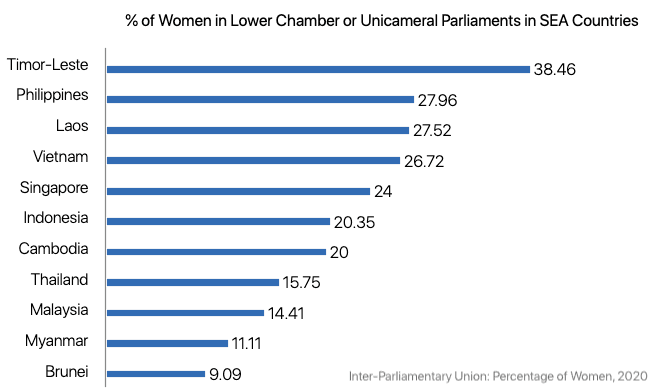Caroline Criado Perez in her book, Invisible Women:
As of December 2017, women made up an average of 23.5% of the world's parliamentarians, although this figure hides significant regional variation: Nordic parliaments are on average 41.4% female while Arab parliaments are on average 18.3% female.1 Women account for 10% or less of parliamentarians in thirty-one countries, including four countries that have no female parliamentarians at all. And in most countries precious little is being done to remedy this. (p. 272)
Naturally, this made me wonder what the figures are like in Thailand parliament.
From my research on the Thai National Assembly website, there are 78 women out of 489 MPs in the House of Representatives, making it 15.95% female. Note that this figure does include the first transgender MP elected to the Thai parliament, Tanwarin Sukkhapisit, but they actually identify as non-binary. I'm counting them in as the stat I'm looking for is about how male-dominated the parliament is.
On the Senate side — where senators are not elected but appointed by the military government — there are 26 women out of 250 senators, making it 10.4% female.
In total, there are 104 women out of 739 MPs. This makes the Thai parliament as a whole only 14.1% female.
Now let's see how Thailand fares against other countries2. Keep in mind the world average as of 2019 is 24.5% and in Asia it's at 19.7%.
Thailand's House of Representatives is ranked 132nd (out of 188 countries) in terms of percentage of women in the lower chamber or unicameral parliaments. Within South East Asia, it comes in at 8th out of 11 countries, beating out just Malaysia, Myanmar, and Brunei. The irony is that a lot of Thais often look down on their neighboring countries such as Laos, Vietnam, Indonesia, and Cambodia as being less developed.

Now for the Senate (again, not elected but appointed by the junta), out of 78 countries with an upper chamber, Thailand's is ranked 71st, only beating out countries such as Nigeria, Yemen, and Haiti. And amongst the 5 South East Asian countries with an upper chamber, it comes in dead last.
Needless to say, this is embarrassing for Thailand. But then what isn't embarrassing about this country's current political situation?
-
The percentage for the House is going to be a bit lower here since the IPU's figure does not include Tanwarin. ↩︎